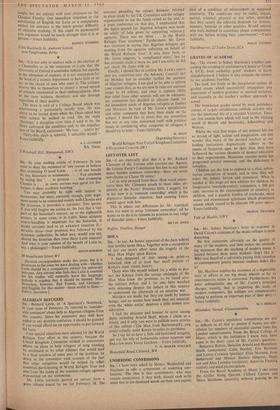SIR.—I n your leading article of February 26 you seem to
deny the existence' of 'any reason to believe that cramming 0 level Latin . . . is of any benefit to, say, historians or economists. . . .' You conclude by saying that ‘. . . to pretend . . . that cramming Classics is . . . in some curious way good for his- torians, is sheer academic humbug.'
You may probably be right with respect to economists; but since, curiously enough; your argu- ment seems to be concerned mainly with Classics and the historian, it provokes a rejoinder. You ignore, if you will forgive me saying so, the fact that a vast Part of the historian's sources, up to the eighteenth century in some cases, is in Latin. Since accurate source-handling is important for the historian, it would certainly lead to an awkward situation if- /I/imbue dictu—your proposal was followed by the academic authorities. In what way, would you say, should the historian then treat these Latin sources? And what is your opinion of the benefit of Latin to, say, a philologist?—Yours faithfully.
[Several correspondents make this point, but it is irrelevant to the issue we were dealing with—whether Latin should be. a compulsory subject for university entrance. Any entrant who feels that Latin is essential for his studies will naturally learn the language; nobody is arguing that it should be banned. Most historians, however, find French, and German— and English, for that matter—more useful to them.— Edi t o r, Spectator.]










































 Previous page
Previous page